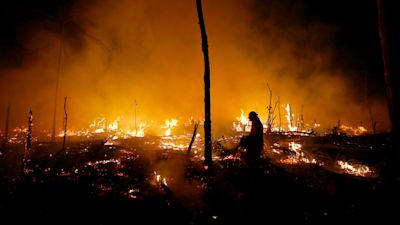It’s official - 2023 was the hottest year on record

ITV News Science Correspondent Martin Stew breaks down the data on the globe's hottest ever year
It’s official. 2023 was the hottest year on record. Beating the previous warmest - 2016 - by 0.17C.
That may not sound much, but is huge when you consider it is a global average over an entire year.
Significantly, it was also very close to breaching the limit set by the Paris Climate agreement.
That is the target to keep global temperature rises below 1.5 degrees above pre-industrial levels. 2023 was 1.48 degrees above that.
The data was collected by the Copernicus satellite. It also found, for the first time ever, every single day global temperatures were more than a degree hotter than pre-industrial levels.
There were two days - November 17 and 18 - where temperatures were more than two degrees warmer.
And it’s not just air heat records which have been broken.
Sea temperatures reached record highs. Antarctic sea ice reached record lows and extreme weather events struck around the globe: from European drought and heatwaves, to deadly floods in Libya and huge Canadian wildfires.
So, what caused it?
One reason is the natural phenomenon of El Nino. Where a change in direction of trade winds in the Pacific seas ocean temperatures rise.
El Nino years tend to be hotter as a result. That began last summer.
But scientists say by far the biggest driving factor is still greenhouse gasses emitted by humans. Levels of Carbon dioxide and methane both rose again last year to record highs.
That doesn’t bode well for this year. Emissions aren’t going down and we can expect the impact of El Nino to be more pronounced this year. As a result it is "likely" 2024 will be even hotter and breach the 1.5 degree level.
That means the chances of more extreme droughts, wildfires, and flooding goes up.
However, it won’t officially mean we’ve missed the Paris target because that relies on a 20 year average, not a single year.
It does, though, set a very worrying precedent.
Want a quick and expert briefing on the biggest news stories? Listen to our latest podcasts to find out What You Need To Know...